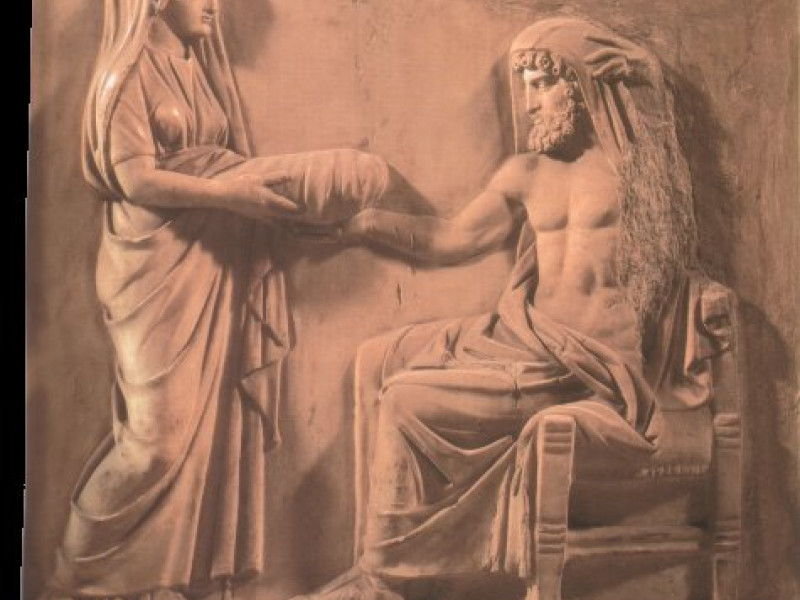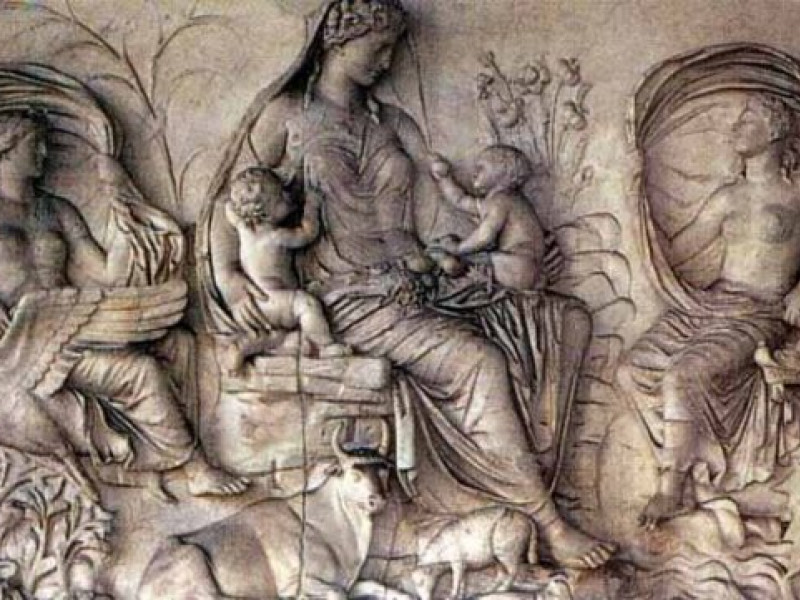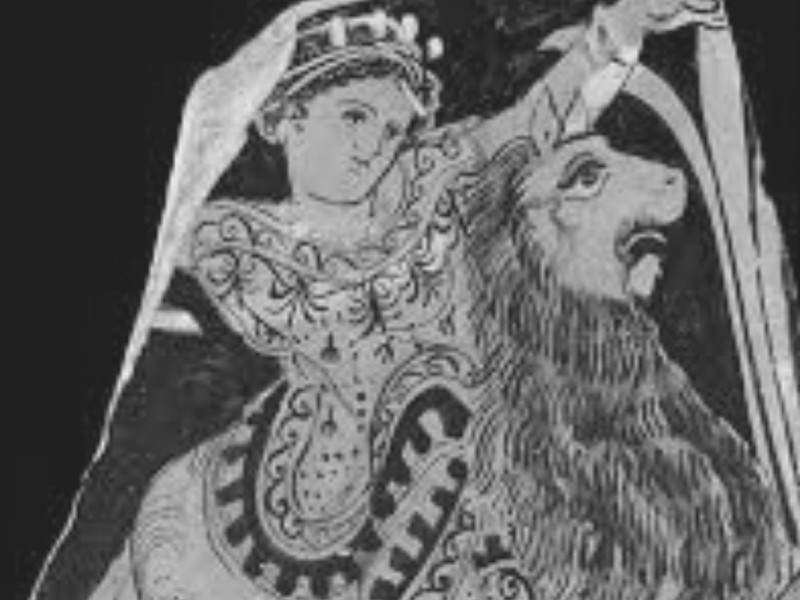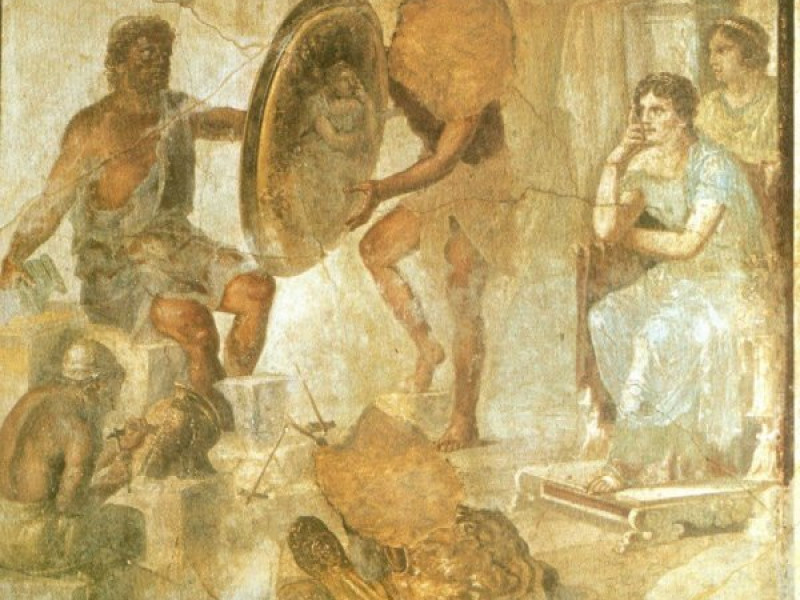Gaea (Earth)
The personification of earth and the goddess of the earth. Gaea was also known as Gaia or Ge, but to the Romans she was known as Terra Mater and Tellus. According to Diodorus Siculus, her name was also Titaea.
Gaea was born together with Nyx ("Night"), Erebus, Tartarus, and Eros ("Love"), out of Chaos. Without a mate (or probably she mated with Aether), she bore Uranus ("Heaven"), Ourea ("Mountains") and Pontus ("Sea").
By her own son Pontus, she bore Nereus and Phorcys; both of them were ancient sea-gods.
She married her other son Uranus, who at this time became the supreme ruler of the universe. She was the mother of the Hundred-handed (Hecatoncheires), the Cyclopes and the Titans (See Creation).
When her husband/son imprisoned her children, the Hundred-handed and the Cyclopes under the earth because of their size and hideous looks, Gaea conspired with her son Cronus to remove Uranus from power. Gaea gave a sickle to Cronus where he cut off his own father's genital and threw it into the sea. From this genital, sea foam formed so that Aphrodite the goddess of love was born. From the blood that fell on earth (Gaea), new children were born known as the Gigantes (Giants), Erinyes, and Meliae.
Castrated, Uranus was overthrown by his son, who assumed his mantle as supreme ruler of universe. Cronus and his brothers and sisters (Titans) had high places of authority on heaven and earth (see Titans). Cronus was the one who created the Golden Age of Man. Cronus married his own sister, Rhea (Ops).
However, his rule could not last. Cronus refused to release his mother's other children from prison, so she foretold that Cronus would fall from power from his own son, just as Cronus had deposed his own father. Cronus tried to prevent the fulfilment of the prophecy by swallowing each child Rhea bore him. Only Zeus, the youngest son, escaped the fates of his siblings. Rhea hid the infant (Zeus) in Crete, while she gave her husband a stone wrapped in swaddling-cloth to devour.
With the help of Gaea and the Oceanid Metis, Zeus caused Cronus to disgorge Zeus' siblings when Cronus was given emetic to drink. War broke out between the Titans and the younger Olympians. A few Titans sided with the Olympians, including Prometheus. Prometheus was reputably the wisest of gods. Prometheus advised Zeus to release the Hundred-Handed and the Cyclopes. With these new allies, Zeus had Cronus and his brothers confined in Tartarus. Zeus assumed the mantle of supreme ruler, but shared the world with his brothers, Poseidon and Hades.
Gaea was now unhappy with Zeus and the Olympians for imprisoning most of the male Titans in Tartarus (Underworld). Zeus faced new dangers from Gaea's other children: first the monster Typhon, and later the Gigantes (Giants). Typhon was the son of Tartarus and Gaea. Gaea had foretold that the gods could not defeat the Gigantes unless they were aided by a mortal hero. Zeus had first defeated Typhon, and centuries later defeated the Gigantes with the help of the hero Heracles. See Gigantomachy about Gigantes, on the Heracles' page.
See Creation, Theogony of Hesiod.
Another giant son she bore to Poseidon was Antaeüs (Antaeus), who was killed by Heracles for challenging the hero in a wrestling match. Antaeüs grew stronger whenever he was thrown to the earth, because his strength came from his mother.
She had the ability to foretell the future. She was the first oracle of Delphi before she gave it to her daughter Themis, a Titaness. She prophesied her son's (Cronus) downfall. She also warned Zeus that his second child Metis would overthrow him.
According to the Orphic myth, Gaea and Uranus were not mother and son. Rather, they were sister and brother. They were the children of Protogonus (Phanes) and Nyx.
Her role in the Orphic Creation was minor. The Orphic Nyx seemed to have taken over the role of Hesiodic Gaea because it was Nyx who had prophetic power, and gave advice to three successive rulers of the world: Uranus, Cronus and Zeus.
Related Information
Name
Gaea, Gaia, Ge, Gê, Γαἳα – "Earth" (Greek).
Titaea (Greek).
Terra, Tellus (Roman).
Eponyms
Titaea.
By Jimmy Joe







